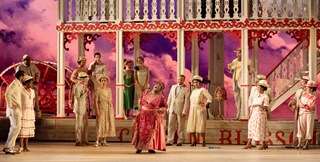|
Back
Show Boat Keeps Rollin’ Along Albany
Cooperstown (Alice Busch Theater)
07/06/2019 - & July 16,* 20, 22, 28, August 1, 3, 5, 11, 15, 17, 20, 24, 2019
Jerome Kern and Oscar Hammerstein, II: Show Boat
Lauren Snouffer (Magnolia Hawks), Michael Adams (Gaylord Ravenal), Lara Teeter (Cap’n Andy), Klea Blackhurt (Parthy Ann Hawks), Judith Skinner (Queenie), Justin Hopkins (Joe), Alyson Cambridge (Julie La Verne), Schyler Vargas (Frank Schultz), Abigail Paschke (Ellie May Chipley), Grant Wenaus (Jake), Bella Crowe (Young Kim)
Glimmerglass Festival Orchestra and Chorus, James Lowe (conductor)
Francesca Zambello (production), E. Loren Meeker (co-director), Peter J. Davison (sets), Paul Tazewell (costumes), Mark McCullough (lights), Eric Sean Fogel (choreography)

(© Karli Cadel)
True to its traditions, New York’s bucolic Glimmerglass Festival has featured a classic American musical among its four major stage productions this summer. And not just any musical, but the Ur-musical, Jerome Kern and Oscar Hammerstein, II’s Show Boat. Nearly a century after its 1927 premiere, the work’s themes of racial discord and substance abuse – to say nothing of its overarching plot about family dysfunction – still resonate strongly and in grand form. It is not at all unreasonable for Glimmerglass’s general director Francesca Zambello to refer to it as the “first American opera.” Nor has her new production tried in any way to sanitize the content, as is so often done now in stagings of classic American works. The opening lines about “colored folks” working with cotton on the Mississippi resounded from the stage, and the infamous “n-word” was pronounced intact, repeatedly, and at full volume. One can count this production as a strong blow for authenticity over the distorted falsehoods of political correctness. Equally, its faithfulness to the Kern’s and Hammerstein’s original preserved the African-American roles and chorus, which were diminished in George Sidney’s 1951 film adaptation. Either way, no one ran screaming from the theater or demanded a “safe space.”
Show Boat’s themes may be operatic, but the cast tended more toward the talents of musical theater. This is not a bad thing, but it does raise the question of whether the opera/musical distinction is important or even worth noting. Michael Adams’s sterling lyric baritone delivered the part of Gaylord Ravenal with rather more elegance than the saccharine oversweetness that Lauren Snouffer brought to his love Magnolia, but neither seemed out of place. Lara Teeter’s showmanship as Cap’n Andy rates him high as a consummate song-and-dance man, perfectly channeling Joe E. Brown’s antics in the 1951 film with an admirable elasticity of movement and gesture. In a perfect foil to Cap’n Andy’s loveable entrepreneur, Klea Blackhurt’s stern mien as his wife Parthy Ann reminded everyone of the character’s proudly announced origins in straitlaced Massachusetts. Judith Skinner and Justin Hopkins played the African-American couple Queenie and Joe. Both parts reflect the era in which they were written in that the specter of minstrelsy is not far off, but these outstanding artists avoided it altogether. Skinner’s Queenie was well voiced and magnetic. Hopkins rendered Joe’s famous “Ol’ Man River” with a stentorian verve that readily reminded us why this song is a standalone favorite of the American song book. The young singers Schyler Vargas and Abigail Paschke sang the loveable losers Frank and Ellie May with amusing comic relief. The real star, however, was the beautiful soprano Alison Cambridge in the role of Julie La Verne. She took “Can’t Help Lovin’ Dat Man of Mine” with a silky smoothness that betrayed the anguish Magnolia would later feel for Gaylord. In the less known “Bill,” however, she surpassed her earlier effort with the tone of a torch song applied to real love.
James Lowe kept a good pace with the orchestra, but one missed the firmer hand of John DeMain, who was listed in the program as a “musical supervisor.” Zambello’s production was storybook in character, with a moving boat that seemed a bit sparse in construction. It offered little comment on the work’s social themes, but adequately captured rundown Southern waterfronts, the luxury of Chicago’s Palmer House Hotel (now a Hilton), and the dance halls and theaters of the era.
Paul du Quenoy
|